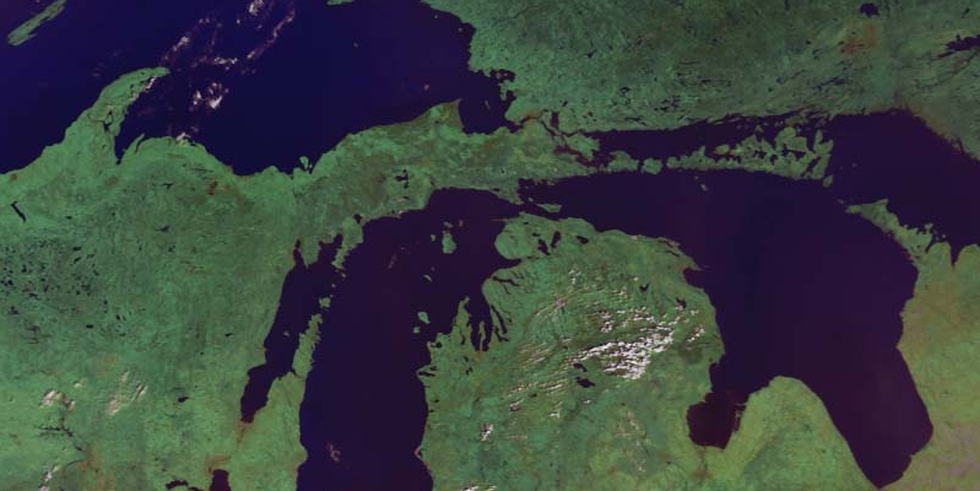
Up North Progressive
Politics and commentary for Northern MichiganEditor’s Note: This article originally appeared on June 13, 2012, on Daily Kos. The author gives permission for it to appear.

Start a discussion about 20th century industry in America and images of factories humming with production probably fill your head. It’s nice that romantic image fills your head because the reality is harsher to comprehend. Many factories today in this country sit idle; the people and machines that made them productive are gone. Rusting, rotting hulks are all that remain. Jobs were made redundant, sent to other countries where labor is still cheap and exploitable. Today a drive on Woodward or Piquette in Detroit or perhaps Flint boasts many empty derelict structures that were once shining jewels of American Capitalism. Don’t worry, they still are the perfect metaphor for Capitalism. Capitalism can shine like a jewel, but in time can also become a deep scar.
The 20th century is not the beginning of industry or capitalism in America however. By traveling back a mere 60 years to around 1840, it is easy to find even older scars where capitalism took hold, made a few men rich, provided jobs for a period of time, then left the land they used scarred from their industry.
Once Michigan was covered with ancient forests filled with majestic trees. The White Pine is Michigan’s state tree for a reason, but not the reason you think. Except for one small piece of land, the White Pine all but vanished from Michigan’s landscape. Millions of board feet of lumber floated down rivers and landed in saw mills in Muskegon, Manistee, Traverse City and Saginaw, to name a few locations. Lumber went to Grand Rapids and became furniture. It rebuilt Chicago after the great fire. Lumber shipped by train went to the great plains and built shanties, homes and towns on the prairie.
The lumber industry provided millions of dollars to very lucky men. Take a drive through Muskegon and you will find a number of buildings, parks and street signs with the name Hackley on them. Hackley was a Lumber Baron. Henry Crapo became Mayor of Flint, and eventually Governor of the state of Michigan. He ran a lucrative saw mill and left a large estate behind that eventually came to his grandson, William Crapo Durant, a carriage builder in Flint. Durant started manufacturing automobiles, then bought other automobile manufacturing companies. We call that conglomerate of car manufacturers General Motors today.
Historical narratives about the Michigan lumber boom inform the reader about the lumber produced, the money the industry brought to the state, and romantic tales about life in the lumber camps. My father used to wake us in the morning with shouting “Daylight in the swamp!” My great grandfather and great grandmother both worked in the lumber camps during the winter months; he trimmed branches from trees, and she cooked in the camp kitchen. What the stories don’t often tell you are how the men who trimmed the tree branches, or ‘swampers’ left piles of these branches on the ground and moved on. The limbs dried out and were the tinder for large, damaging wildfires all over the state. As technological advances made cutting and moving trees easier, lumberjacks didn’t need to be choosy, and land was clear-cut of every tree standing. Once land was cleared, the lumber barons found themselves strapped with ‘worthless’ bare land and the burden of paying taxes. Advertisements describing “cleared farm land.” found their way to newspapers in this country and other countries, enticing people to buy land unseen and travel to claim their purchase. Upon arrival however, they found their property riddled with enormous stumps and with the trees gone, no real tillable soil for farming. Kaleva is one example of a northern Michigan town that came about from Finnish immigrants buying land from the lumber company after all of the trees were removed from the land.
Over a hundred years later, the scars of the lumber boom can still be seen in parts of Michigan. Ancient stumps, the ghosts of old growth forests haunt the new tree lots of Northern Michigan. The lumber boom produced lots of money, produced jobs, but with only 60 years of viable industry, the legacy is resources were consumed and made a few men rich. Everyone else found themselves with stump-riddled land with no value. No value on the surface, but what about resources under the surface?
Right now, our state government is leasing state land to fracking companies. These companies are coming to a Michigan county near you with the intention of extracting natural resources for profit. It also means Michiganders will soon be dealing with the environmental impact of fracking, and the documented health problems that come with it. Politicians paid plenty of money from these companies will tell Michiganders this is a good thing; it will mean desperately needed jobs for Michigan residents. It will also mean more scars left on the Michigan landscape. Scars that we still don’t know how long they will last or how damaging they will really be. The future Scars of Capitalism – a fine American tradition.





Greetings, friend! I love comments and read every one of them.